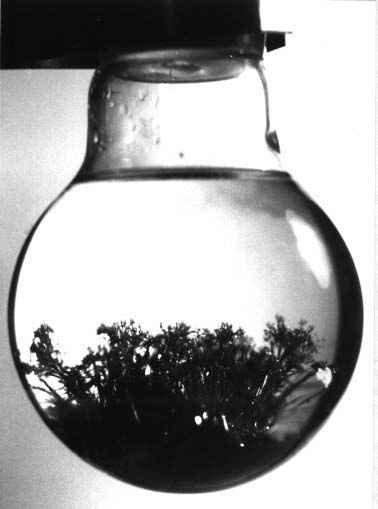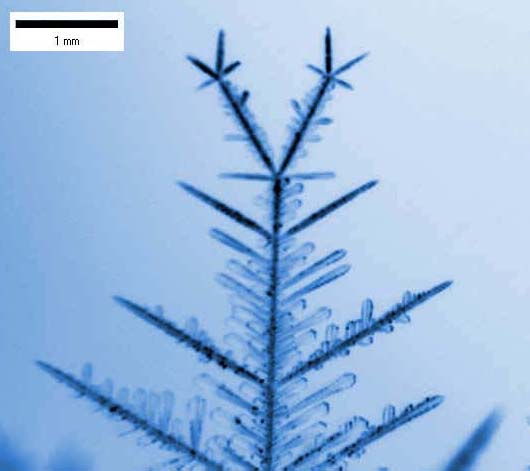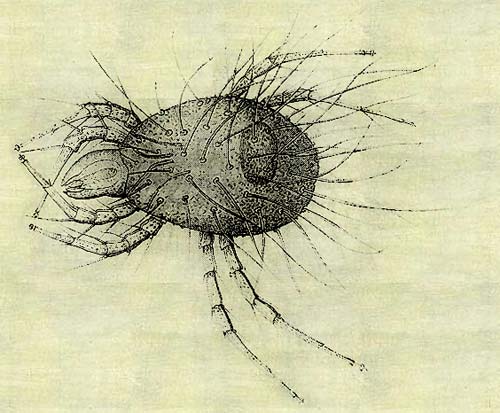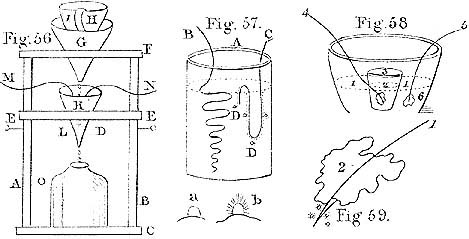

SPRING QUARTER, 2006
Department of History
University of California, Irvine
Instructor: Dr. Barbara J. Becker
|
Week 7. Growth excerpts from
|
...a somewhat different idea of organic creation...
...It may now be inquired,--In what way was the creation of animated beings effected? The ordinary notion may, I think, be not unjustly described as this,--that the Almighty author produced the progenitors of all existing species by some sort of personal or immediate exertion. But how does this notion comport with what we have seen of the gradual advance of species, from the humblest to the highest? How can we suppose an immediate exertion of this creative power at one time to produce zoophytes, another time to add a few marine mollusks, another to bring in one or two conchifers, again to produce crustaceous fishes, again perfect fishes, and so on to the end? This would surely be to take a very mean view of the Creative Power--to, in short, anthropomorphize it, or reduce it to some such character as that borne by the ordinary proceedings of mankind. And yet this would be unavoidable; for that the organic creation was thus progressive through a long space of time, rests on evidence which nothing can overturn or gainsay.
Some other idea must then be come to with regard to the mode in which the Divine Author proceeded in the organic creation. Let us seek in the history of the earth's formation for a new suggestion on this point.
...organic creation is ... a result of natural laws...
We have seen powerful evidence, that the construction of this globe and its associates, and inferentially that of all the other globes of space, was the result, not of any immediate or personal exertion on the part of the Deity, but of natural laws which are expressions of his will. What is to hinder our supposing that the organic creation is also a result of natural laws, which are in like manner an expression of his will? More than this, the fact of the cosmical arrangements being an effect of natural law, is a powerful argument for the organic arrangements being so likewise, for how can we suppose that the august Being who brought all these countless worlds into form by the simple establishment of a natural principle flowing from his mind, was to interfere personally and specially on every occasion when a new shell-fish or reptile was to be ushered into existence on one of these worlds? Surely this idea is too ridiculous to be for a moment entertained....
To a reasonable mind the Divine attributes must appear, not diminished or reduced in any way, by supposing a creation by law, but infinitely exalted. It is the narrowest of all views of the Deity, and characteristic of a humble class of intellects, to suppose him acting constantly in particular ways for particular occasions. It, for one thing, greatly detracts from his foresight, the most undeniable of all the attributes of Omnipotence. It lowers him towards the level of our own humble intellects. Much more worthy of him it surely is, to suppose that all things have been commissioned by him from the first, though neither is he absent from a particle of the current of natural affairs in one sense, seeing that the whole system is continually supported by his providence....
Those who would object to the hypothesis of a creation by the intervention of law, do not perhaps consider how powerful an argument in favour of the existence of God is lost by rejecting this doctrine. When all is seen to be the result of law, the idea of an Almighty Author becomes irresistible, for the creation of a law for an endless series of phenomena--an act of intelligence above all else that we can conceive--could have no other imaginable source, and tells, moreover, as powerfully for a sustaining as for an originating power....
...That harmony ... which generally marks great truths...
It may here be remarked that there is in our doctrine that harmony in all the associated phenomena which generally marks great truths. First, it agrees, as we have seen, with the idea of planet-creation by natural law. Secondly, upon this supposition, all that geology tells us of the succession of species appears natural and intelligible. Organic life presses in, as has been remarked, wherever there was room and encouragement for it, the forms being always such as suited the circumstances, and in a certain relation to them....
Admitting for a moment a re-origination of species after a cataclysm, as has been surmised by some geologists, though the hypothesis is always becoming less and less tenable, it harmonizes with nothing so well as the idea of a creation by law. The more solitary commencements of species, which would have been the most inconceivably paltry exercise for an immediately creative power, are sufficiently worthy of one operating by laws.
It is also to be observed, that the thing to be accounted for is not merely the origination of organic being upon this little planet ... which is but one of hundreds of thousands.... We have to suppose, that every one of these numberless globes is either a theatre of organic being, or in the way of becoming so....
Is it conceivable, as a fitting mode of exercise for creative intelligence, that it should be constantly moving from one sphere to another, to form and plant the various species which may be required in each situation at particular times? Is such an idea accordant with our general conception of the dignity, not to speak of the power, of the Great Author? Yet such is the notion which we must form, if we adhere to the doctrine of special exercise. Let us see, on the other hand, how the doctrine of a creation by law agrees with this expanded view of the organic world....
...the doctrine of creation by law...
Suppose that the first persons of an early nation who made a ship and ventured to sea in it, observed, as they sailed along, a set of objects which they had never before seen--namely, a fleet of other ships--would they not have been justified in supposing that those ships were occupied, like their own, by human beings possessing hands to row and steer, eyes to watch the signs of the weather, intelligence to guide them from one place to another--in short, beings in all respects like themselves, or only shewing such differences as they knew to be producible by difference of climate and habits of life.
Precisely in this manner we can speculate on the inhabitants of remote spheres. We see that matter has originally been diffused in one mass, of which the spheres are portions. Consequently, inorganic matter must be presumed to be everywhere the same, although probably with differences in the proportions of ingredients in different globes, and also some difference of conditions. Out of a certain number of the elements of inorganic matter are composed organic bodies, both vegetable and animal; such must be the rule in Jupiter and in Sirius, as it is here....
Gravitation we see to be an all-pervading principle: therefore there must be a relation between the spheres and their respective organic occupants, by virtue of which they are fixed, as far as necessary, on the surface. Such a relation, of course, involves details as to the density and elasticity of structure, as well as size, of the organic tenants, in proportion to the gravity of the respective planets....
Electricity we also see to be universal; if, therefore, it be a principle concerned in life and in mental action, as science strongly suggests, life and mental action must everywhere be of one general character.
We come to comparatively a matter of detail, when we advert to heat and light; yet it is important to consider that these are universal agents, and that, as they bear marked relations to organic life and structure on earth, they may be presumed to do so in other spheres also.
The considerations as to light are particularly interesting, for, on our globe, the structure of one important organ, almost universally distributed in the animal kingdom, is in direct and precise relation to it. Where there is light there will be eyes, and these, in other spheres, will be the same in all respects as the eyes of tellurian animals, with only such differences as may be necessary to accord with minor peculiarities of condition and of situation.
...a small stretch...
It is but a small stretch of the argument to suppose that, one conspicuous organ of a large portion of our animal kingdom being thus universal, a parity in all the other organs--species for species, class for class, kingdom for kingdom--is highly likely, and that thus the inhabitants of all the other globes of space bear not only a general, but a particular resemblance to those of our own.
Assuming that organic beings are thus spread over all space, the idea of their having all come into existence by the operation of laws everywhere applicable, is only conformable to that principle, acknowledged to be so generally visible in the affairs of Providence, to have all done by the employment of the smallest possible amount of means. Thus, as one set of laws produced all orbs and their motions and geognostic arrangements, so one set of laws overspread them all with life. The whole productive or creative arrangements are therefore in perfect unity.
CHAPTER 13
PARTICULAR CONSIDERATIONS RESPECTING THE ORIGIN OF THE ANIMATED
TRIBES.
[Supporting facts]
THE general likelihood of an organic creation by law having been shewn, we are next to inquire if science has any facts tending to bring the assumption more nearly home to nature. Such facts there certainly are; but it cannot be surprising that they are comparatively few and scattered, when we consider that the inquiry is into one of nature's profoundest mysteries, and one which has hitherto engaged no direct attention in almost any quarter.

|
|
Arbor Dianæ |
Crystallization is confessedly a phenomenon of inorganic matter; yet the simplest rustic observer is struck by the resemblance which the examples of it left upon a window by frost bear to vegetable forms. In some crystallizations the mimicry is beautiful and complete; for example, in the well-known one called the Arbor Dianæ [Tree of Diana].
An amalgam of four parts of silver and two of mercury being dissolved in nitric acid, and water equal to thirty weights of the metals being added, a small piece of soft amalgam of silver suspended in the solution, quickly gathers to itself the particles of the silver of the amalgam, which form upon it a crystallization precisely resembling a shrub....
Vegetable figures are also presented in some of the most ordinary appearances of the electric fluid. In the marks caused by positive electricity, or which it leaves in its passage, we see the ramifications of a tree, as well as of its individual leaves; those of the negative, recall the bulbous or the spreading root, according as they are clumped or divergent.
These phenomena seem to say that the electric energies have had something to do in determining the forms of plants. That they are intimately connected with vegetable life is indubitable, for germination will not proceed in water charged with negative electricity, while water charged positively greatly favours it; and a garden sensibly increases in luxuriance, when a number of conducting rods are made to terminate in branches over its beds. With regard to the resemblance of the ramifications of the branches and leaves of plants to the traces of the positive electricity, and that of the roots to the negative, it is a circumstance calling for especial remark, that the atmosphere, particularly its lower strata, is generally charged positively, while the earth is always charged negatively. The correspondence here is curious. A plant thus appears as a thing formed on the basis of a natural electrical operation....

|
|
Snow crystal grown in an electric field. When
the applied voltage crossed a certain threshold, the tip of the crystal
split and began growing symmetrically in two divergent directions. |
[E]xperiments conducted a few years ago by Mr. Crosse [English gentleman scientist, Andrew Crosse (1784-1855)] ... seemed to result in the production of a heretofore unknown species of insect in considerable numbers. Various causes have prevented these experiments and their results from receiving candid treatment, but they may perhaps be yet found to have opened up a new and most interesting chapter of nature's mysteries. Mr. Crosse was pursuing some experiments in crystallization, causing a powerful voltaic battery to operate upon a saturated solution of silicate of potash, when the insects unexpectedly made their appearance. He afterwards tried nitrate of copper, which is a deadly poison, and from that fluid also did live insects emerge.

|
"By this mode of observation we perceived that the body was of an oval form, the belly slightly flattened, and the back very round, particularly towards the hind end of the body.
"The skin of the back appeared chagrined, or as strewed with an infinite number of very small tubercles, of which a certain number, larger than the others, distributed here and there, serve as a base or bulb for long hairs or silks, which are at least as long as the body of the animal.
"All these hairs fixed and raised on the protuberant back of this kind of acarus, give it the appearance of a microscopic porcupine, to which the elongated snout also contributes."
--excerpt from "Note on a kind of Acarus...," by Pierre Turpin, translated and reprinted in Annals of Electricity, Magnetism & Chemistry, Vol. 2: 355-360 (January-June 1838)
Discouraged by the reception of his experiments, Mr. Crosse soon discontinued them; but they were some years after pursued by Mr. Weekes, of Sandwich [English experimentalist, William Henry Weekes (1790-1850)], with precisely the same results. This gentleman, besides trying the first of the above substances, employed ferro-cyanet of potash, on account of its containing a larger proportion of carbon, the principal element of organic bodies; and from this substance the insects were produced in increased numbers. A few weeks sufficed for this experiment, with the powerful battery of Mr. Crosse; but the first attempts of Mr. Weekes required about eleven months, a ground of presumption in itself that the electricity was chiefly concerned in the phenomenon. The changes undergone by the fluid operated upon, were in both cases remarkable, and nearly alike.
In Mr. Weekes' apparatus, the silicate of potash became first turbid, then of a milky appearance; round the negative wire of the battery, dipped into the fluid, there gathered a quantity of gelatinous matter, a part of the process of considerable importance, considering that gelatin is one of the proximate principles, or first compounds, of which animal bodies are formed. From this matter Mr. Weekes observed one of the insects in the very act of emerging, immediately after which, it ascended to the surface of the fluid, and sought concealment in an obscure corner of the apparatus. The insects produced by both experimentalists seem to have been the same, a species of acarus, minute and semi-transparent, and furnished with long bristles, which can only be seen by the aid of the microscope. It is worthy of remark, that some of these insects, soon after their existence had commenced, were found to be likely to extend their species. They were sometimes observed to go back to the fluid to feed, and occasionally they devoured each other.

Apparatus in which Crosse's acari first made their appearance. |
The reception of novelties in science must ever be regulated very much by the amount of kindred or relative phenomena which the public mind already possesses and acknowledges, to which the new can be assimilated. A novelty, however true, if there be no received truths with which it can be shewn in harmonious relation, has little chance of a favourable hearing....
The experiments above described, finding a public mind which had never discovered a fact or conceived an idea at all analogous, were of course ungraciously received. It was held to be impious, even to surmise that animals could have been formed through any instrumentality of an apparatus devised by human skill. The more likely account of the phenomena was said to be, that the insects were only developed from ova, resting either in the fluid, or in the wooden frame on which the experiments took place.
On these objections the following remarks may be made. The supposition of impiety arises from an entire misconception of what is implied by an aboriginal creation of insects. The experimentalist could never be considered as the author of the existence of these creatures, except by the most unreasoning ignorance. The utmost that can be claimed for, or imputed to him is that he arranged the natural conditions under which the true creative energy--that of the Divine Author of all things--has pleased to work in that instance.
On the hypothesis here brought forward, the acarus Crossii was a type of being ordained from the beginning, and destined to be realized under certain physical conditions. When a human hand brought these conditions into the proper arrangement, it did an act akin to hundreds of familiar ones which we execute every day, and which are followed by natural results; but it did nothing more. The production of the insect, if it did take place as assumed, was as clearly an act of the Almighty himself, as if he had fashioned it with hands. For the presumption that an act of aboriginal creation did take place, there is this to be said, that, in Mr. Weekes's experiment, every care that ingenuity could devise was taken to exclude the possibility of a development of the insects from ova. The wood of the frame was baked in a powerful heat; a bell-shaped glass covered the apparatus, and from this the atmosphere was excluded by the constantly rising fumes from the liquid, for the emission of which there was an aperture so arranged at the top of the glass, that only these fumes could pass. The water was distilled, and the substance of the silicate had been subjected to white heat. Thus every source of fallacy seemed to be shut up. In such circumstances, a candid mind, which sees nothing either impious or unphilosophical in the idea of a new creation, will be disposed to think that there is less difficulty in believing in such a creation having actually taken place, than in believing that, in two instances, separated in place and time, exactly the same insects should have chanced to arise from concealed ova, and these a species heretofore unknown....
![]()

|